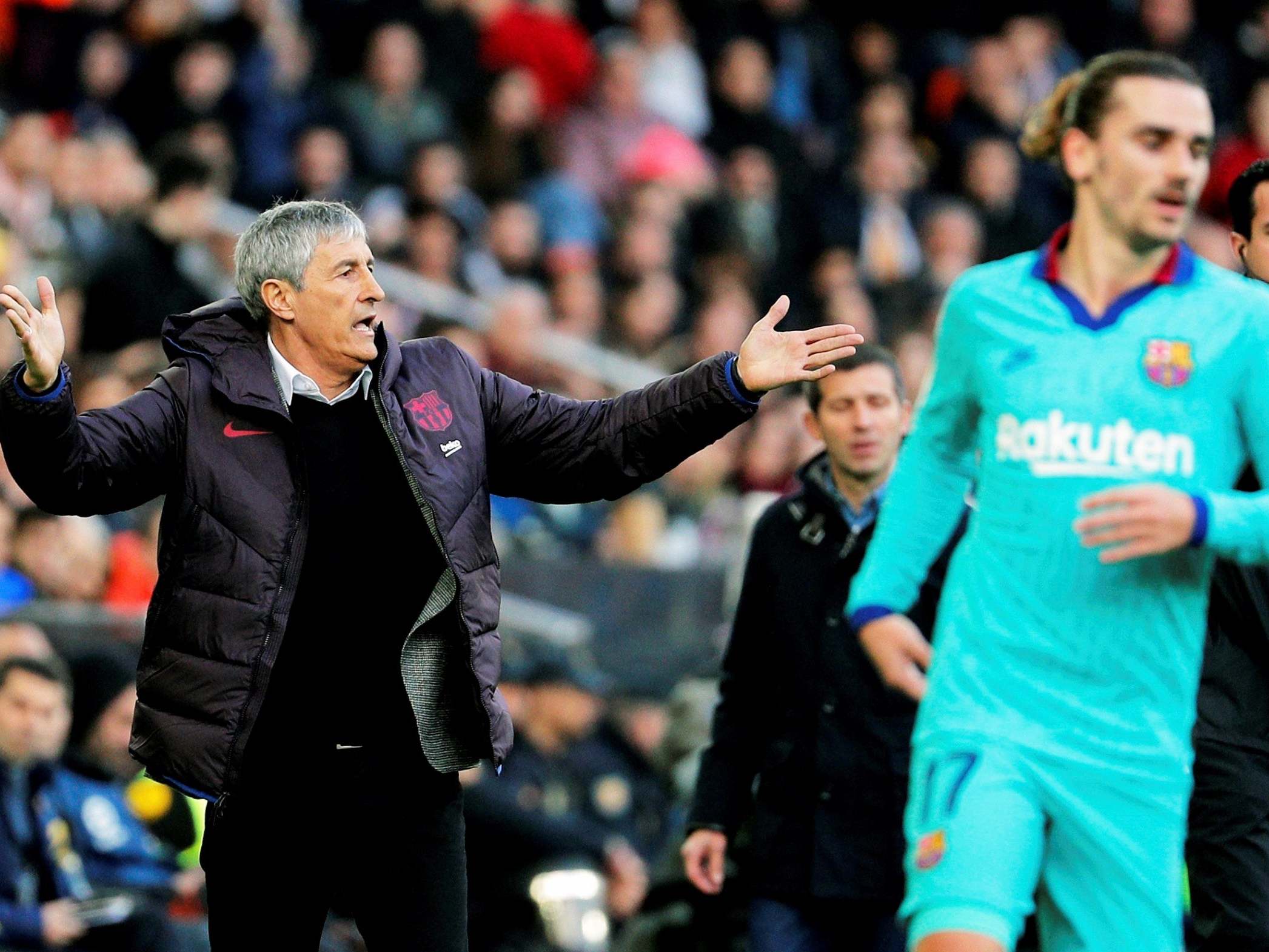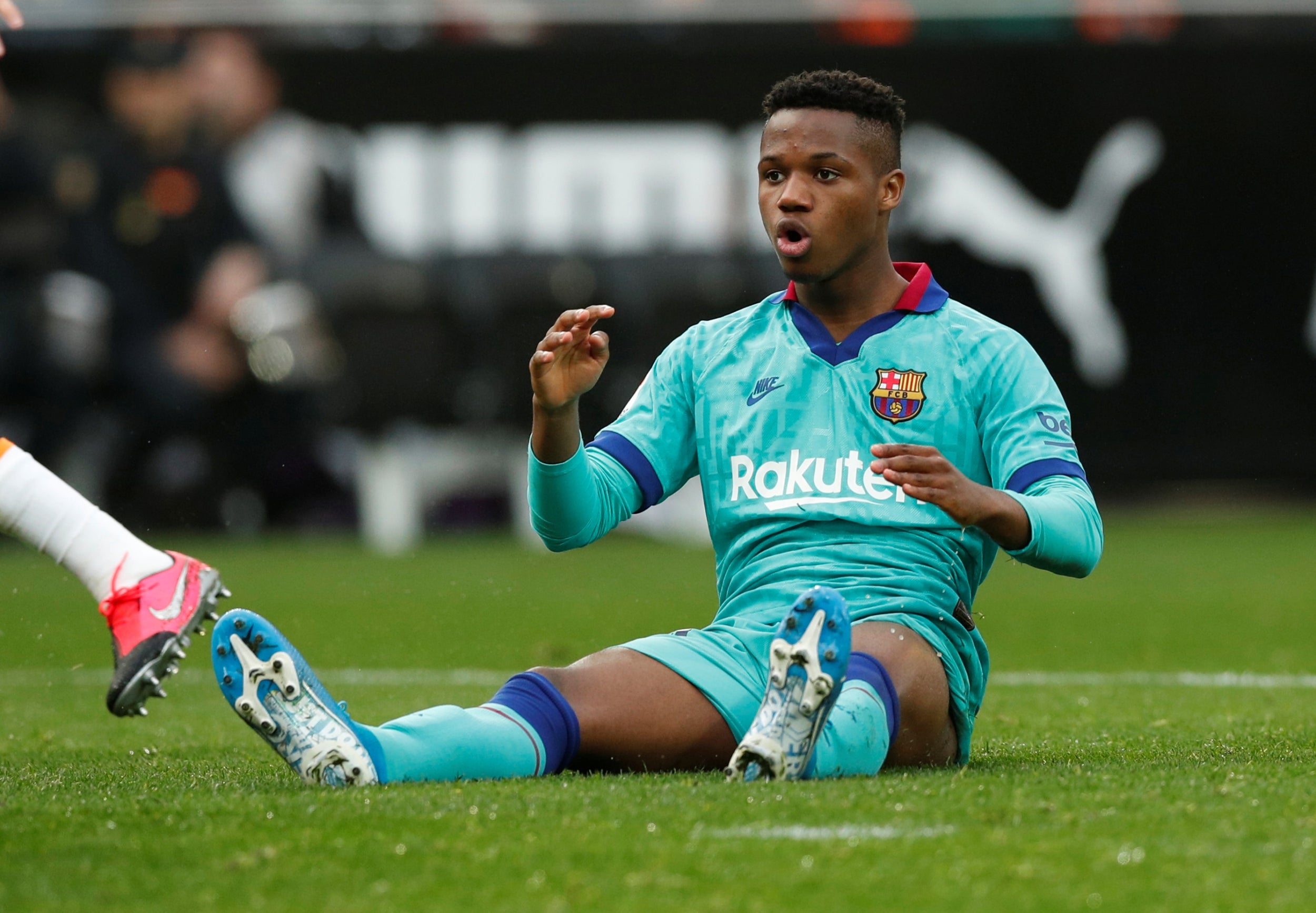Barcelona's Quique Setien experiment makes bad start as crucial Clasico and Champions League games loom
Dismal defeat by Valencia showed why taking over a side in mid-season is never easy, especially when the task involves not just winning games but doing it in a such a principled way

After failing his first real test as Barcelona’s new coach on Saturday at Valencia, Quique Setien explained that his players did not yet understand the lessons he was trying to teach them.
Despite Barca out-passing Valencia by 867 to 298, the game’s only two goals were scored by Valencia striker Maxi Gomez, who also missed a penalty, while home defender Gabriel Paulista had what seemed a third bizarrely ruled out.
The first 10 minutes of the game at the Mestalla were almost comically predictable, as Barca played keep-ball in front of the home defence. Then Valencia’s first attack saw left-back Jose Gaya slice through and into the box, where he was chopped down by Gerard Pique. Marc-Andre ter Stegen saved Gomez’s spot kick, but a pattern had been set.
Setien’s side continued to dominate possession without looking in the least bit threatening, Valencia sat deep and awaited their chance to break. Ter Stegen pushed a Maxi Gomez shot onto the crossbar, then scrambled back to his feet to tip Kevin Gameiro’s follow up around a post.
Barca’s only threat at all in the first 45 were two Lionel Messi free kicks – one sailed too high, the other landed softly in the arms of Valencia goalkeeper Jaume Domenech. Their best chance came when Los Che’s Carlos Soler misplaced a pass and suddenly midfielder Arthur Melo was free 18 yards out – but instead of shooting the Brazilian tried and failed to feed the ball sideways to Messi.
“The first half we were not good, the best thing was to reach the break at 0-0,” Setien admitted afterwards. “They stopped us from moving the ball forward, we played many senseless passes, which is not what we want. We explained some things at half-time, the position of some players changed, and it helped us a lot, as we found more space and pushed Valencia back a lot more.”
Barca did start more positively after the break, and 17-year-old forward Ansu Fati came close within seconds of the restart. But Valencia were soon ahead when a counter caught the Barcelona defence all out of position, and Gomez’s shot deflected past Ter Stegen.
The game became much more open, Valencia took advantage when a superb run and pass by teenager Ferran Torres gave Maxi a chance to make it 2-0, with the Barca back four again at sixes and sevens. It could / should have been three when Gabriel hooked in at a corner, but after a lengthy VAR check the officials ruled it out.
With Antoine Griezmann and Frenkie de Jong unsure of where o be and what to do, Messi took responsibility on himself. Not for the first time. The captain hit 11 of Barca’s total 14 shots at goal – the joint-most without scoring of his entire La Liga career. But the outstanding Gabriel blocked superbly, a clever chip landed on the roof of the net, a header flew just wide, and Domenech pushed away a late free kick and the final whistle brought Barca’s first defeat at Mestalla since 2008.
Over-reliance on Messi was one of the sticks used to beat former coach Ernesto Valverde, and the set-up and shape of Setien’s side did not look that different to when Barca were also losing at Athletic Bilbao, Granada and Levante earlier this season.
Among the players to look most lost was De Jong, whose Ajax DNA should be useful in understanding Setien’s Johann Cruyff inspired ideas, if the Barcelona narrative is to believed. Asked post-game about the Netherlands international’s performance, Setien took a while to choose his words carefully, as if not wanting to share the full bluntness of his appraisal.
“Not just him, but the rest of the team, there are things we can correct,” he said. “Frenkie is a great player, who has been playing in a certain way these last months, and now we are asking him to do something else. He needs time to understand things – him and many of the others. One thing is to understand instructions on a blackboard, on the pitch it is difficult, even more against a team like Valencia who defend very well.”
That transition from the blackboard to the pitch is now Setien’s big challenge. Next up is Leganes in the Copa del Rey midweek, with Napoli in the Champions League and a La Liga Clasico at the Bernabeu looming.
Zinedine Zidane’s side are not playing great stuff at the moment, but keep finding a way to win. Nacho Fernandez’s header at a set-piece brought a 1-0 victory at Valladolid on Sunday evening, and moved Los Blancos three points clear at the top the table.
Setien is clearly being honest when he says he is trying to return to return Barca to their traditional values and style of play. But is quickly finding that is easier said than done, especially with the profile and attitude of the current squad.
The new coach’s biggest tactical tweak so far has been to use Sergi Roberto in a hybrid full-back/centre-back role on the right side of the defence, and teenager Fati as a right-winger who needs to track back and fill space without the ball. Both Valencia’s goals, and the missed penalty, came from issues in that area of the team. It seemed Setien was trying to force players into roles they are not very suited to.

Experienced head Valverde realised the limitations he was working under, with most of Barca’s most important players now the wrong side of 30. Even though his pragmatic approach got them to win two Liga titles quite easily, a noisy section of Barca fans and pundits grew angry at his allegedly stodgy tactics, while senior players reportedly also wanted to ‘return’ to how things used to be done.
Taking over a side in mid-season is never easy, especially when the task involves not just winning games but doing it in a such a principled way. Someone who has managed to win over his team’s players and fans without any pre-season is Valencia coach Albert Celades, who has quietly impressed since stepping in when the very popular Marcelino Garcia Toral was sacked in September.
Unlike Setien, Celades does have Barca DNA. He joined La Masia aged just 13, made his first team debut under Cruyff in 1995, and won two La Liga titles at the Camp Nou as a midfield colleague of Pep Guardiola.
Celades has taken a much more practical approach to dropping into a job at short notice, and been careful not to tinker too much. Valencia remain a team who play to their strengths and adapt to their circumstances. They also had a ready made plan for how to beat Barca from their smash and grab victory in last season’s Copa del Rey final.
Such a results-based philosophy is not for Setien, who believes that the way to success is to successfully ‘teach’ his players the true way to play football.
“There are ‘resultadistas’ who will not care how we play,” Setien said on Friday. “But there are many others who know if a team has deserved to win or not. The fairest thing to do is judge whether the path leads you to victory or defeat. We need the players to understand the details, to produce the changes we want to introduce. And in theory that should not take us much time.”
That theory is now being tested in practice – and the early results are not encouraging.
Join our commenting forum
Join thought-provoking conversations, follow other Independent readers and see their replies
Comments